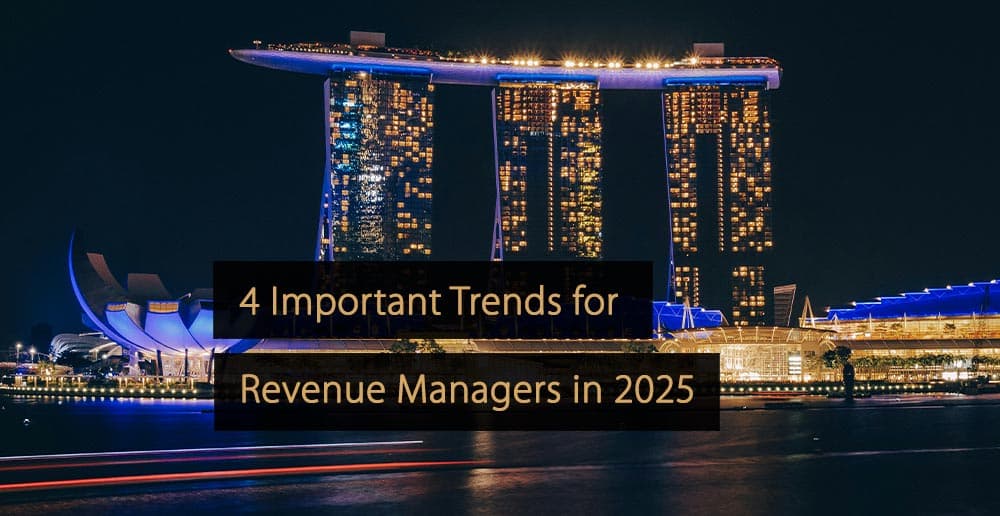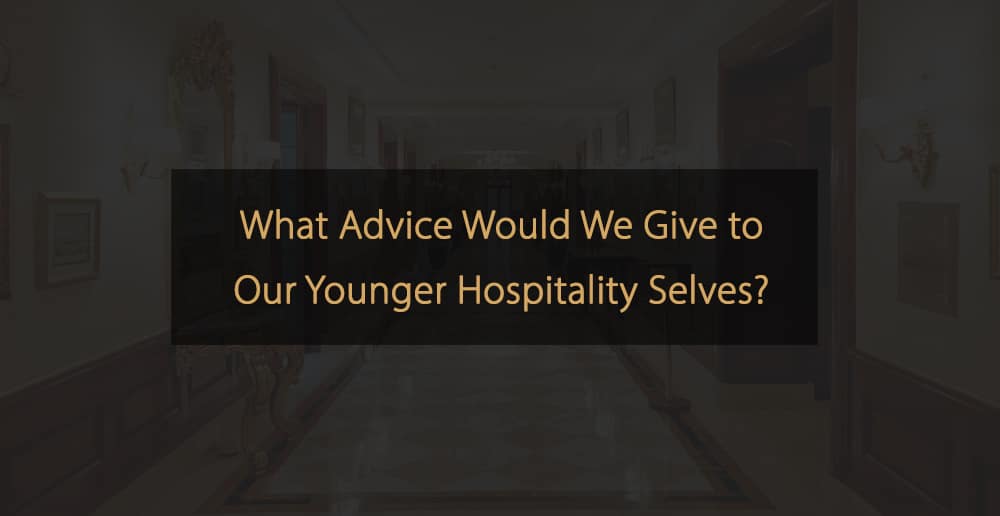Question for Our Revenue Management Expert Panel:
What are the benefits of hyper-personalisation in revenue management? What do hotels need to do in order to achieve hyper-personalisation, and are their efforts worth it? (Question by Nikolas Hall)
Industry Expert Panel
Our Industry Expert Panel exists out of professionals within the hospitality & travel Industry. They have comprehensive and detailed knowledge, experience in practice or management and are forward-thinking. They are answering questions about the state of the industry. They share their insights on topics like revenue management, marketing, operations, technology and discuss the latest trends.
Our Revenue Management Expert Panel
- Tanya Hadwick – Group Revenue & Yield Leader, SunSwept Resorts
- Diego Fernández Pérez De Ponga – Director of Revenue Management, Palladium Hotel Group
- Krunal Shah – Director of Revenue Management, The Biltmore Mayfair, LXR Hotels & Resorts
- Pablo Torres – Director, TEDUKA
- Massimiliano Terzulli – Revenue Management Consultant, Franco Grasso Revenue Team
- Alenka McMahon – Managing Director, Hotel Revenue Services Limited
- Damiano Zennaro – Founder, DZ Consulting
- Fabian Bartnick – Founder, Infinito
- Connor Vanderholm – CEO, Topline
- Oleksii Kapichin – Revenue Management Professional
- Heiko Rieder – Vice President Business Development, Hirmer Hospitality and Travel Charme Hotels
- Ask Our Panel a Question
- Join Our Expert Panel
“If we can use the volume of data that we often have on our guests to tailor our services to the individual customer and understand their wants and needs, we can often secure higher repeat guest levels and revenue spend. Effective tools that enable everyone to see the relevant information and shift through the data are key – we often have a lot of information that is never put into use. Bespoke customer experiences are key in a world where you need to stand out against the competition.”
“I believe that hyper-personalisation in revenue management brings several benefits. Firstly, it enhances the guest experience by tailoring services to individual preferences, leading to higher satisfaction and loyalty. Secondly, it allows hotels to optimise revenue by delivering targeted promotions and pricing based on each guest’s unique characteristics and behaviours.
To achieve hyper-personalisation, hotels need to invest in integrating their Revenue Management System (RMS) with their Customer Relationship Management (CRM) system. This enables the collection and analysis of guest data in real-time for personalised marketing and pricing strategies. Additionally, staff training and development are crucial to effectively utilising guest data and delivering personalised experiences.
Although technological limitations may pose challenges, the efforts to achieve hyper-personalisation are worthwhile. In an increasingly competitive hospitality industry, personalised experiences differentiate hotels, foster guest satisfaction, and drive revenue growth. By investing in advanced technology, data analytics, and staff training, hotels can move closer to achieving hyper-personalisation and gain a competitive edge.”
“Hyper-personalisation is becoming a trend in the hospitality industry. Being creative is the key. Nowadays, instead of gathering the data, it’s important to gather their behavioural aspect and their history in order to hyper-personalise their stay.
Spending time researching the guest profile and history can help create that hyper-personalised touch. For example, if a famous singer is staying at your property, you can request the pastry chef to create a pastry which is in the shape of a microphone with some welcome comments to hyper-personalise their stay.”
“There are two main points here: having the right data, and the right software to analyse it, so that the team can then move into hyper-personalisation.
Having said that, I believe that hyper-personalisation is the way to move forward. The same that happens with airlines, where it’s rare that 2 customers pay the same price for the same flight, and this is what we will eventually have in the hotel industry. Linking advanced revenue management software with attribute-based selling, each customer should be able to book (and pay) purely for what they want to enjoy and experience.”
“It depends on what you mean by hyper-personalisation. If the goal is to try to offer a service tailored to the individual customer, taking into account their specific preferences and indications, then surely it could be a path to take in order to improve the perception of the value for money ratio and therefore the possibilities of an excellent review.
Certainly, this requires the adoption of adequate technological tools (CRM, software upselling, reputation software, etc.), and sufficient staff to manage personalised and one-to-one relationships with guests. The resources to invest could be many and it is a service that could be suitable to small properties such as luxury boutique hotels with very high ADRs.
For accommodation facilities with hundreds and hundreds of rooms (therefore with a very high volume of guests) or mid-range/budget properties, it may be more complicated to implement these processes or in any case, the investment may not be followed by a proper economic return.
If hyper-personalisation is a way to create a niche market by excluding other segments, then from a commercial and revenue management perspective there may be more risks than benefits.”
“Yes, hyper-personalisation takes the lead in collecting data and drives performance and better customer outcomes. The efforts are worth it to create the hotel’s offerings and services to the specific needs and desires of the guests.”
“Hyper-personalisation could be a lever to apply a guest-centric revenue management and marketing strategy, targeting the right person at the right time, with the right product, at the right price through the right channel (does it sound familiar?). Much will depend on how clients are approached in trying to avoid the common feeling of “big brother is watching you”.
Regardless of the level of personalisation you wish to reach, an integrated technology eco-system is essential to be successful, starting from PMS, RMS and of course an integrated CRM. Loyalty programs in this sense are also pivotal to reaching clients with personalised offers and rates.”
“Hyper-personalisation would essentially kill revenue management at the moment as the industry is still stuck in segmentation. Segmentation and Hyper do not go together. We also know too little about the person booking for us to make a “hyper” assumption – tricky when we do not even have the look-to-book ratio or know how we can tie those together. Let me put it this way: If you try Hyper and you ask what the customer likes….and you get it wrong, then you are screwed, get it right and it is as expected!
However, anticipating and getting it wrong is forgiven, getting it right though is priceless. Lastly – the issue with hyper is multipersonal profiles – I am a dad, a husband, a business owner, a revenue rockstar – all different traits and pressure points. My advice: Keep the hyper for delighting your guests once they have booked!”
“Hyper-personalisation certainly has its place in leisure, luxury, and boutique hotels. Individuals are paying for an experience and want to be blown away. The details throughout the entire customer journey matter to these guests and their loyalty will be impacted by their experience. To achieve this, hotels should focus on person-to-person interactions even if it’s via a welcome text or email. Automation should be reserved for the back end and not be obvious to the guest that their interaction is facilitated by tech.”
“Let’s look at your Amazon and Netflix accounts. After logging in, you’ll notice personalized recommendations that enhance your shopping experience and ultimately boost sales for these companies. However, when guests visit your hotel’s website, they see the same room options, deals, packages, and rates. When it comes to email marketing campaigns for hotels, there are often limited customisation options available. As a result, limited-time offers or creative package deals are typically sent to all guests who have stayed at the hotel.
Here are three ways to enhance the personalisation of hotel products for guests:
- Automatic website segmentation. The idea is to segment guests who visit the hotel’s website based on various criteria (country, time of the day, stay dates, device, length of stay, etc.) and personalize offers based on that segmentation. By implementing this approach, hotels can boost their conversions and revenue. Triptease and The Hotels Network are the best-known tech solutions for website segmentation and personalisation.
- Self-segmentation. Adding filters to the booking engine will help guests find the perfect room type and rate plan quickly instead of scrolling through all available options (OTAs already do this!). Filters can include the number of beds, view, price range, room location, size, outdoor space, bathroom type, amenities, floor, etc. Feature-based selling is the future of hotel retailing.
- Customer relationship systems. CRMs have information about guests’ past stays and preferences and should be the basis of segmentation practices. Hotels should move from broad segments to identify small groups of customers or even individual customers and tailor prices and offers for them (email campaigns).”
- Enhanced Customer Experience: Hyper-personalisation allows hotels to tailor their offerings and services to individual guests, creating a more personalised and memorable experience. This can include customised room preferences, special amenities, and personalised recommendations.
- Increased Customer Loyalty: When guests feel that a hotel understands their preferences and caters to their specific needs, they are more likely to return in the future. Loyalty programs and tailored experiences can foster long-term relationships.
- Higher Revenue: By offering personalised add-ons, upsells, and promotions, hotels can increase their revenue per guest. Guests are more likely to spend on personalised offerings that align with their preferences.
- Competitive Advantage: Hyper-personalisation sets a hotel apart from competitors. Guests are more likely to choose a hotel that offers tailored experiences over one with generic offerings.
- Data-Driven Insights: Gathering and analysing guest data for personalisation can provide valuable insights into guest preferences and behaviour, helping hotels refine their marketing and service strategies.
- Cost Efficiency: By focusing on personalisation, hotels can allocate resources more efficiently, targeting specific guest segments with offerings that are more likely to lead to bookings.
Ask a Question & Join Our Expert Panel
Would you like a question to be answered by our Industry Expert Panel? Or would you like to join our community of experts and share your experience, insights, and knowledge with fellow industry professionals? Via the buttons below you can submit a question or submit a request to become part of our expert panel.
More Tips to Grow Your Business
Revfine.com is the leading knowledge platform for the hospitality and travel industry. Professionals use our insights, strategies, and actionable tips to get inspired, optimize revenue, innovate processes, and improve customer experience.Explore expert advice on management, marketing, revenue management, operations, software, and technology in our dedicated Hotel, Hospitality, and Travel & Tourism categories.


















Leave A Comment